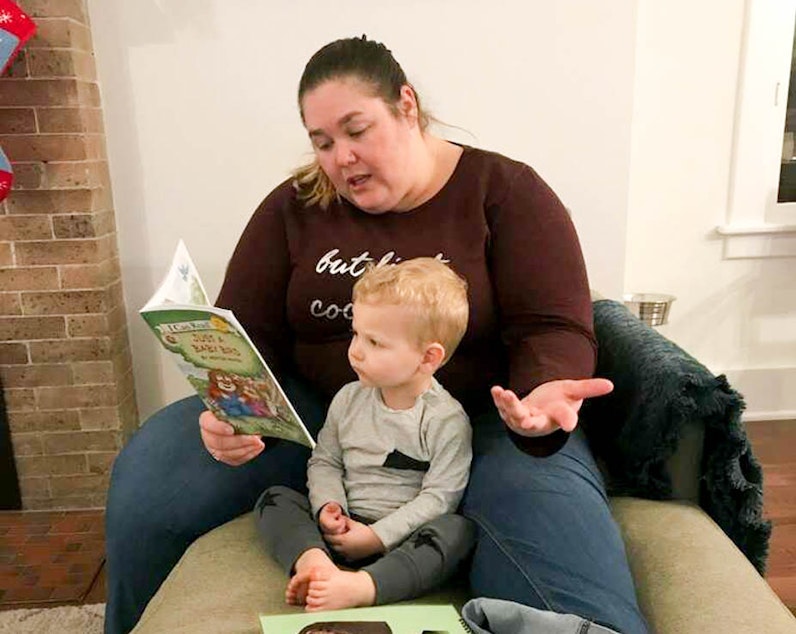Which nannies are essential during coronavirus? There's clarity on that now

On the day that Gov. Jay Inslee ordered non-essential businesses to hit pause, nanny Rachel Crittenden spent hours on the phone with the governor's office to get clarity on nannies being “essential” workers.
Other nannies flooded the office with emails.
The order said that nannies working for families where the parents were deemed "essential" could continue going to work. But it also deemed childcare as essential.
The nannies wanted it to be made clear to families with non-essential workers that they were not supposed to show up to work. Some families were asking their nannies to keep coming.
“We’re incredibly dedicated to our families, and most of us want to help our families and don’t want to leave them in a position without care,” Crittenden said. “But we also have our own families at home who might be immunocompromised or high risk.”
A week and one day after the order was issued, on Tuesday, the governor's office made it explicit with a new proclamation.
The proclamation reads: “Nannies and other persons who are providing childcare in the child’s own home are essential workers if they are caring for the children of essential workers.”
This means that nannies who care for children of a doctor -- considered essential by the state -- are in turn deemed essential.
Janette Mitchell was another nanny pushing for the clarification. She said some nannies wanted to continue caring for the children of non-essential employers. But mostly, she said, home workers wanted to follow the mandate.
"I think the laws need to protect the most vulnerable," Mitchell said. "I wanted this to be more clear for the whole community -- to protect those who need it."
Hand in Hand, a national network of domestic workers, said employers who do not qualify as "essential" should pay their workers as they wait out the stay-at-home orders.
“For those employers who can, we recommend offering paid time off to your employees, so that they can shelter-in-place and continue to pay their bills," the Hand in Hand guidance states.
The guidance goes on to say: "We recognize that this is not possible for many attendant employers and some nanny employers who must report for work in the medical field and other essential operations, or whose very lives depend on their workers.”
Crittenden, a longtime nanny who comes from a long line of caretakers and one governess, is being paid by the family she works for, even though she is not going to work. She considers herself fortunate.
Others weren’t afforded that luxury.
Having deep roots in the “tight-knit” community of nannies, Crittenden said she heard from nannies who were asked to work despite the stay-at-home order. Some were told that if they didn't show, the families would fight the unemployment claim.
For undocumented workers, the dilemma is more complicated, and the power balance is even more prominently in the hands of the employer. Crittenden said one nanny shared that her employer had the neighbor bring their kids over, even though the nanny objected, without extra pay.
“The parents know she can’t report them, and she can’t get unemployment. They have her over the barrel,” Crittenden said.
Undocumented nannies are more often paid under the table. That means they do not qualify for unemployment when a family lays them off.
Some resources exist. The National Domestic Workers Alliance has a Coronavirus Care Fund to help out. The application does not require a Social Security number and provides $400 in emergency assistance for care workers, nannies, and house cleaners in financial hardship. There's also a GoFundMe online fundraising campaign for Washington state nannies.
While some clarity was given concerning nannies, the governor has yet to say if care is required for children of two-parent households where one parent is essential and the other is not.
A Seattle nanny faced this: One parent in the family is essential, while the other was laid off.
"Despite the mom being home, they still say they need me," the nanny said. The nanny is not being named to protect their privacy.
But the larger problem for this nanny was that they did not feel safe going to work, given the pandemic. The nanny said they have asthma, a compromised immune system, and an anxiety disorder.
The nanny has used paid time off for a week and a half -- the amount of paid time the nanny had banked. The family said they could not pay the nanny beyond that time if the nanny did not return to work.
The nanny said the thought of returning to work as the virus continues to spread has brought on panic attacks, but that they couldn't afford not to work.
After last night's clarification, nanny Janette Mitchell noted that this morning brought nanny layoffs. However, some were given the choice to either switch to live-in or quit.
"We understand it is not easy to be home and trying to work and dealing with kids at the same time," Crittenden said. "At the same time there are 100,000 to 200,000 deaths possible in the next two weeks. That should take precedent over anything."

